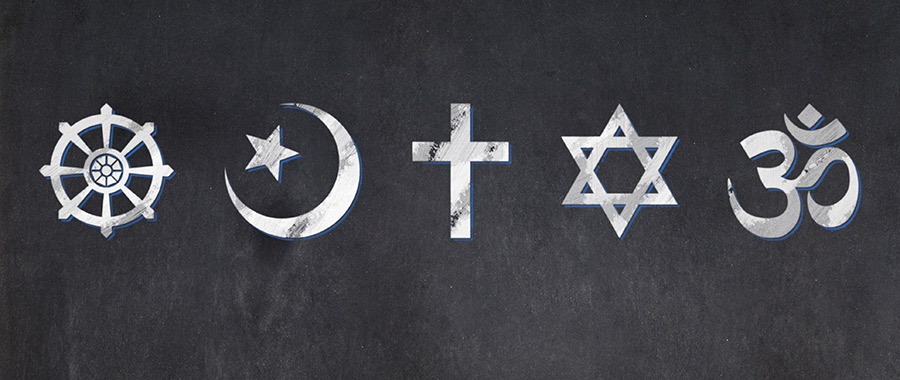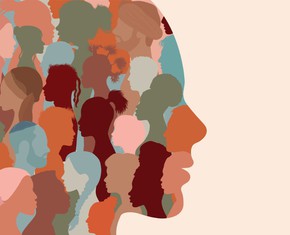The views expressed in our content reflect individual perspectives and do not represent the authoritative views of the Baha'i Faith.
At the World Parliament of Religions, I kept asking myself: Can the world’s religions ever unite?
Can you imagine, just for a moment, what might happen if that occurred? Strife and warfare would diminish drastically, love and harmony would increase, and we could all address the truly pressing issues the world faces together.
The Baha’i teachings hold that vision, and Baha’is around the world work for that unified outcome. The Baha’i teachings say:
God has created us, one and all—why do we act in opposition to His wishes, when we are all His children, and love the same Father? All these divisions we see on all sides, all these disputes and opposition, are caused because men cling to ritual and outward observances, and forget the simple, underlying truth. It is the outward practices of religion that are so different, and it is they that cause disputes and enmity—while the reality is always the same, and one. The Reality is the Truth, and truth has no division. Truth is God’s guidance, it is the light of the world, it is love, it is mercy. These attributes of truth are also human virtues inspired by the Holy Spirit.
So let us one and all hold fast to truth, and we shall be free indeed!
The day is coming when all the religions of the world will unite, for in principle they are one already. There is no need for division, seeing that it is only the outward forms that separate them. – Abdu’l-Baha, Paris Talks, pp. 120-121.
At the World Parliament of Religions, I got a glimpse of what this kind of spiritually-unified future might look like—and it felt revelatory. These three final themes showed me the possibilities of inter-religious cooperation and unity:
WPOR Theme #4: Justice—Advancing Concrete Change Toward a Just, Peaceful, Sustainable World
Much like climate change, the concept of justice permeated many of the presentations and much of the discussion every day. This ranged from justice toward living creatures; respect for cultural differences; justice among people in all human affairs; and permanent practices to ensure sustainability. Though we may not now have a universal standard by which to measure justice, a universally-accepted religious concept such as “the golden rule” at least gives us a starting point. Two quotations come to mind:
Injustice anywhere is a threat to justice everywhere. – Martin Luther King, Jr.
… justice will become manifest in human conditions and affairs, and all mankind will find comfort and enjoyment in life. – Abdu’l-Baha, The Promulgation of Universal Peace, p. 133.
Theme #5: Countering War, Hate & Violence—Peace and Love, Not War, Hate & Violence
As more than one speaker pointed out, the people who attend WPOR self-select—they want to be there. WPOR attendees respect each other, are curious about each other’s Faith, honor our diversity, and earnestly want to work together. So to all of us attending, the idea of peace and love rather than war and hate isn’t even a point of discussion. This made me realize that our chief task involves healing ourselves, acknowledging our spiritual essence, and working together, just as the Baha’i teachings encourage us all to do:
The gift of God to this enlightened age is the knowledge of the oneness of mankind and the fundamental oneness of religion. War shall cease between the nations and by the will of God the most great peace shall come; the world will be seen as a new world and all men will live as brothers. – Abdu’l-Baha, Divine Philosophy, p. 13.
Theme #6: Next Generations—Interfaith Has No age, Youth Voices for Change
As one of the presenters said, “Youth are our teachers now.” Judging from the presence of youth and young adults at the WPOR, I tend to agree.
I especially admired the passion some of the young adult presenters brought to the topics of climate change, justice, inclusiveness, and compassion. They evinced clear thinking, wisdom and a range of experience beyond what we might guess if we knew their ages. For example, I met an 18-year old who has organized literally millions of trees being planted. We heard from young men and women from all around the world who put their convictions into action. Not one dwelled on blaming the rest of us for the world’s problems. In the absence of blame, these inspiring youth channel action—and results.
What’s Next for Me?
Midway through the second day I already felt tremendously inspired, overwhelmed with ideas, and frustrated with not knowing what to do next. I also wondered why I am here now—why are any of us here now? Is it possible that we are here because together we can make a difference?
Just as I thought about this, I heard a speaker suggest that rather than ask “Why me?” it would be better just to say “Wow, me!”
With that in mind, I am looking forward to contributing in concrete ways, beginning by telling you about the World Parliament of Religions. I will write columns for my local newspaper and will be doing at least one public presentation. I am in the process of reinvigorating my volunteer work related to climate change. I am looking forward to discussing action plans with like-minded people in nearby communities to seek either initiatives to join or perhaps finding one to start. Having just spent several days with close to 10,000 people from 220 faiths, I am newly eager to continue interfaith events here closer to home.
What will you do to help the world’s religions unite? Please join with all those who want to help humanity realize this wonderful vision:
Inasmuch as the essential reality of the religions is one and their seeming variance and plurality is adherence to forms and imitations which have arisen, it is evident that these causes of difference and divergence must be abandoned in order that the underlying reality may unite mankind in its enlightenment and upbuilding. All who hold fast to the one reality will be in agreement and unity. Then shall the religions summon people to the oneness of the world of humanity and to universal justice; then will they proclaim equality of rights and exhort men to virtue and to faith in the loving mercy of God. – Abdu’l-Baha, The Promulgation of Universal Peace, p. 98.
















Comments
Sign in or create an account
Continue with Googleor